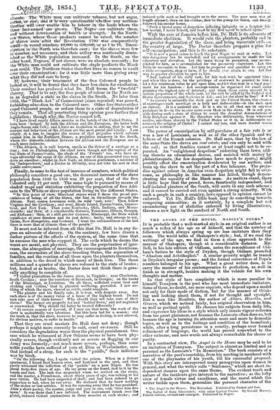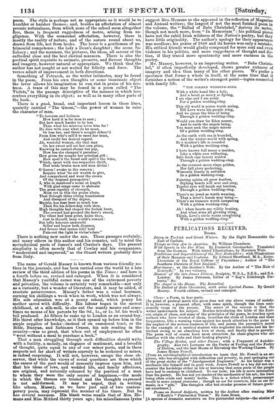TRH ANGET. IN IgE HOUSE. MASSEV_S POEMS..
IT is probable that a wellinarked style &Lan original author is as muck 'a reflex of his age as of himself, and that the number, of followers which always spring up are less imitators than they seem. The world talks of Shakspere's style ; ..but, if ire rid the writings of. the age, we find in them a close approach to -the manner of Shakspere, though at a considerable distance. .11r. Bell, in his late edition of -Oldham, notes the resemblance of Old- ham's Satires to the style of Dryden, though Oldham preeetled "Absolom and Achithophel.". A similar priority might be tramcl in Dryden's irregular poems ; and the formal correctness of Pope's numbers belonged to his age. What a great writer does, is to carry the manner of his contemporaries to perfection as .well in finish ,as in strength, besides making it the vehicle for his own
thoughts and matter. .
In that style of bare simplicity which is more peculiar .to himself, Tennyson is the poet who has most immediate imitators. Some of these, no dolibt, are mere copyists, who depend upon a model not only for their mode of diction, but for the manner -of think- ing and looking about them, if not for thought and eyesight. But a man like Moultrie, the author of Altars, Hearths, a:J(1 Graves, which we noticed lately, has original observation in him, as well as poetical spirit. He chooses his subjects from daily life, and expresses his ideas in a style which only innate -vigour redeems from too great plainness, not because the Laureate often does so, but because the age is turning its attention more and more to domestic. topics, as well as to the feelings and condition of the homeliest; while, after a long persistence in a courtly, perhaps over formal refinement of language, the world has passed somewhat to the other extreme, and uses words not always remarkable for choice or purity.
In a contracted view, The Angel in the House may be said to be an imitation of Tennyson. The subject is almost as limited and as personal as the Laureate's "In Memoriam." The book consists of a narrative of the poet's courtship, from his meeting in manhood with one of the playmates of his youth, till his successful proposaL With this story are interspersed many panegyrics upon women in
general, and what the writer calls "Sentences," which are short in- dependent stanzas upon the same theme. The evident truth and nature of the incidents give interest to the narrative; • as the lofty view of female virtue and excellence and the moral which the writer builds upon them, generalize the personal character of the • The Angel in the House. The BetrothaL Published by Parker and Son. - The Ballad of Babe Christabel; with other Lyrical Poems. By Gerald Massey. Fourth edition, reviseartact enlarged. Published by Bogue.
poem. The style is perhaps not so appropriate as it would be to humbler or harsher themes ; and, besides an affectation of almost prosaic naturalness, from which none of the school seem altogether free, there is frequent ruggedness of metre, arising from ne- gligence. With the occasional affectation, however, there is mostly the reality of nature and of the nature round about us, drawn from life, not from books. The lover is a gentleman of pa- trimonial competence ; the lady a Dean's daughter; the scene Sa- lisbury; and the manners, the pictures, the ideas, all savour of the cathedral close and the best clerical manners. There is also the poetical spirit requisite to animate, preserve, and flavour thoughts and imagery, however natural or appropriate. We think that the author has not sought or not waited for felicity and force. The verses admit of improvement in both directions. Something of Petrarch, as the writer intimates, may be found in the poem. From his own thoughts or some inanimate object the lover allows his imagination to run riot in praise of his mis- tress. A trace of this may be found in a poem called "The Violets," in the passage descriptive of the manner in which love centres everything in its object; as well as in many other parts of the book.
There is a good, broad, and important lesson in these lines, quaintly entitled "The Queen,"—the power of woman to raise the character of man.
"To heroism and holiness How hard it is for man to-soar; But how much harder to be less Than what his mistress loves him for !
He does with ease what do he must,
Or lose her, and there's nought debarr'd From him whes oall'd to meet her trust, And credit her desired regard.
Ali, wasteful woman, she that may
On her sweet self set her own price,
Knowing he cannot choose but pay, How has she oheapen'd paradise; How given for nought her priceless gift ; How spoil'd the bread and spill'd the wine, Which, spent with due respective thrift, Had made brutes men and men divine !
0 Queen.! awake to thy renown ;
Require what 'tis our wealth to give,
And comprehend and wear the crown Of thy despised prerogative!
who in manhood's name at length With glad songs came to abdicate The gross regality of strength, Must yet in this thy praise abate, That through thine erring humbleness And disregard of thy degree, Mainly, haa man.been so much less Than. Ste his fellowship with thee. High thoughts had shaped the foolish brow, The coward' had grasped the hero's sword, The vilest had been-great, hadst thou, Just to thyself, been worth's reward : But lofty honours undersold Seller-and buyer both disgrace, And favour that makes folly bold Puta.out the light in virtue'sface."
There is nothing new under the sun.. These passages certainly, and many others in this author andhis comates, call to mind the metaphysical poets of James's and Charles's days. The present simplicity is often merely that of Cowley and his companions, "modernized and improved," as the Stuart writers probably drew from Italy.
The name of Gerald Massey is known from various friendly no- tices in the journals, and has been carried over the world by a late review of the third edition of his poems in the Times : and here is a fourth before us, revised and enlarged. When it is considered that Massey's youthful career was one of the extremest poverty and privation, the volume is certainly very remarkable—not only as a curiosity, but a wonder of literature, and it may be added, of resolute perseverance. Massey's father was a oanal boatman, earning ten shillings a week when in work, which was not always. His sole education was at a penny school, which penny his mother saved with difficulty. His labour began in. the merest childhood, at a silk-mill, to.eke out the scanty means and some- times no means of his parents by the 9d., L., or Is. 3d. his week's toil produced. At fifteen he came up to London as an errand-boy. His thirst after knowledge, as it then opened up before him in the ample supplies of books—instead of an occasional tract, or the Bible, Bunyan, and Robinson Crusoe, hia sole reading in the country—was so. great, that when out of employment he often "went without a. meal to purchase a book."
That a man struggling through such difficulties should write with a. facility, a melody, an elegance of sentiment, and a breadth of thought, quite equal to any of our minor poets, and in these respects not far short of writers scarcely to be reckoned as minor, is indeed surprising. It will not, however, escape the close ob- - server, that while the views of social questions are those which the career of the poet would, of necessity impress upon him, and that his ideas of love, and wedded life, and family affections, are original, and. naturally coloured by the position of a man to whom they were the only source of happiness,—the mode in which the themes are treated and the thoughts expressed is not self-formed., It may be urged, that in writing like others, Massey, aa we have just said of two contem- porary poets, may represent the manner of his times. But he has several manners. His blank verse recalls that of Mrs. He- mans and Miss Mitford thirty years ago; his miscellaneous lyrics
stivest Mrs. Hemans as she appeared in the reflection of Magazine an Annual writers; the longest if not the most finished poem in the volume, the "Ballad of Babe Christabel," derives its metre, though not much more, from "In Memoriam": his political pieces have not the rabid Irish wildness of the Nation's poetry, but they have little originality. The author's apology for their appearance was needless ; his praise of 1848 and its heroes was only a mistake. His critical friends would gladly compound for more zeal and even violence in his politics, and more ruggedness of thought and die-
' tion if they traced more spontaneity and more raciness in the poetry.
Mr. Massey, however, is an improving writer. "Babe Christa- bel," if often imperfectly developed, shows greater richness of imagery and idea. than many of his other pieces. We prefer a specimen that forms a whole in itself, at the same time that it furnishes a notion of the writer's strongest point—topics connected with family life.
"THE GOLDEN WEDDING-RING.
With a white hand like a lady,. And a heart as merry as Spring, I am ripe and I am ready For a golden wedding-ring.
This old world is scarce worth seeing, Till Love wave his purple wing, And we gauge the bliss of being Through a golden wedding-ring.
Would you draw far Eden nearer, And to earth the angels bring, You must seek the magic mirror
Of a golden wedding-ring.
As the earth with sea is bounded, And the winter-world with spring, So a maiden's life is rounded With a golden wedding-ring.
I have known full many a maiden, Like a white rose withering, Into fresh ripe beauty redden Through a golden wedding-ring.
As the crescent moon rings golden, Her full glory perfecting, Womanly beauty is unfolden In a golden wedding-ring.
Fainting spirits oft grow fearless, Sighing hearts will soar and sing, Tearful eyes will laugh out tearless, Through a golden wedding-ring.
There's no jewel so worth wearing, That a lover's hands may bring— There's no treasure worth comparing With a golden, wedding-ring.
! when hearts are wildly beating, And when arms all glowing cling, Think, Love's circle wants completing With a golden wedding-ring."



























 Previous page
Previous page